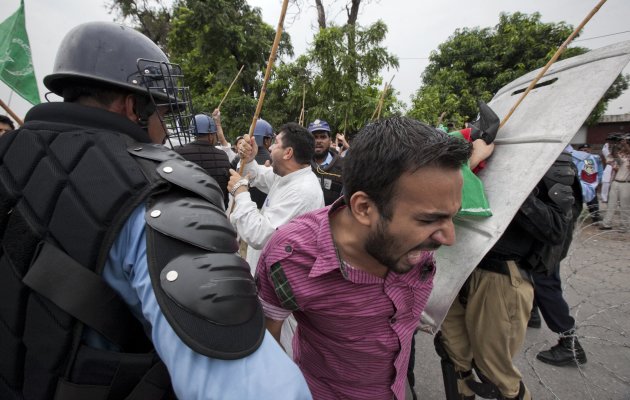KHARTOUM/TUNIS
(Reuters) - Fury about a film that insults the Prophet Mohammad tore
across the Middle East after weekly prayers on Friday with protesters
attacking U.S. embassies and burning American flags as the Pentagon
rushed to bolster security at its missions.
At least seven people were
killed as local police struggled to repel assaults after weekly Muslim
prayers in Tunisia and Sudan, while there was new violence in Egypt and
Yemen and across the Muslim world, driven by emotions ranging from piety
to anger at Western power to frustrations with local leaders and
poverty.
A Taliban attack on a base in Afghanistan that killed two Americans may also have been timed to coincide with protests.
But three days after the
amateurish film of obscure origin triggered an attack on the U.S.
consulate in the Libyan city of Benghazi that killed the ambassador and
three other Americans on September 11, President Barack Obama led a
ceremony to honor the returning dead and vowed to "stand fast" against
the violence.
"The United States will
never retreat from the world," said Obama, who in seeking re-election
must defend his record on protecting U.S. interests, both at embassies
and more widely in a region where last year's Arab Spring revolts
overthrew pro-Western autocrats to the benefit of once-oppressed
Islamists.
For a third day,
television pictures of flames licking around embassy compounds and
masked youths exchanging rocks for teargas from riot police were the
dominant images of Arab attitudes to Washington. Most diplomatic staff
were absent, as most of the region marked the weekend.
But bullets flew. In
Tunis, at least two people were killed and 29 were wounded, the
government said, after police gunfire near the U.S. embassy in the North
African city that was the model for last year's pro-democracy
revolutions.
Counting on Washington for
economic aid, Tunisian President Moncef Marzouki condemned what he
called "an attack on the embassy of a friendly nation".
Three died, too, in the
Sudanese capital Khartoum, state radio said, while there were also
deaths in Cairo and in Lebanon.
As U.S. military drones
faced Islamist anti-aircraft fire over Benghazi, about 50 marines landed
in Yemen a day after the U.S. embassy there was stormed. For a second
day in the capital Sanaa, police battled hundreds of young men around
the mission. Washington also sent Marines to reinforce security at its
embassy in Sudan.
Egypt's new Islamist
president, Mohamed Mursi, condemned a third day of stone-throwing and
siege around the U.S. embassy in Cairo, a linchpin of U.S. policy in the
Middle East. Mursi must tread a line between appealing to an electorate
receptive to the appeal of more hardline Islamists and maintaining ties
with Washington, which long funded the ousted military dictatorship.


No comments:
Post a Comment